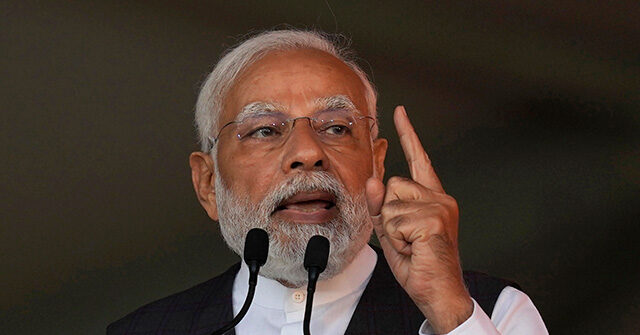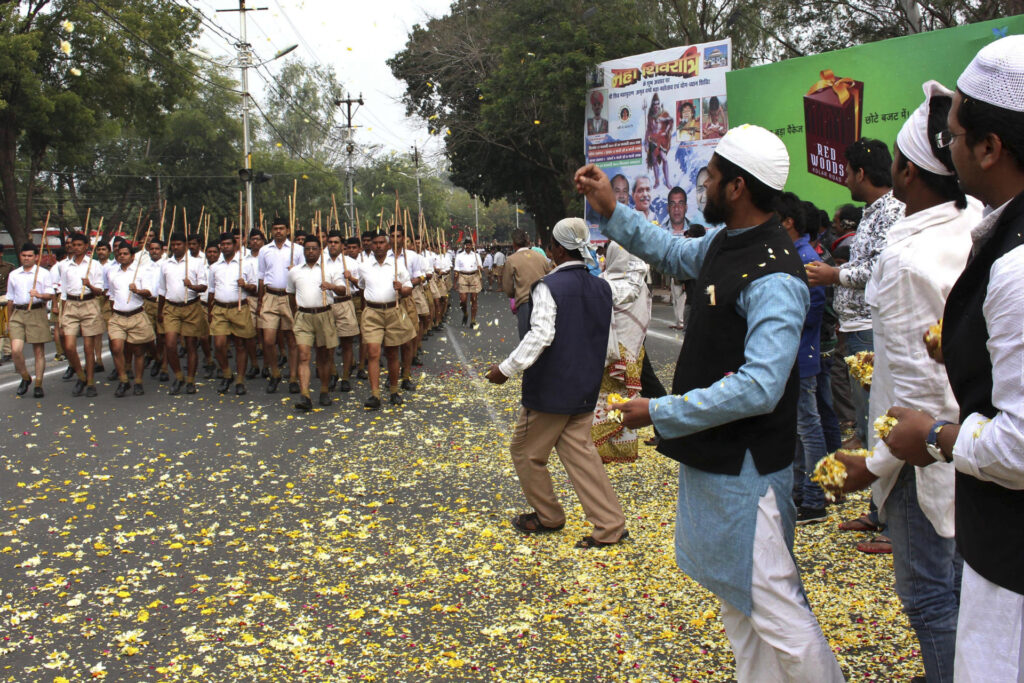
Indian Prime Minister Narendra Modi assembled a cabinet for his third term on Sunday and, for the first time in modern India’s history, appointed no Muslim officials.
The New Indian Express noted that Modi’s cabinet “saw representation from across states, classes and castes, but not for the 200 million Muslim population in the country.”
The opposition lambasted Modi during his campaign for playing to Hindu nationalists and fueling sentiments against Muslims. One of his more controversial talking points was urging Indian voters to oppose a Muslim “Vote Jihad,” an effort allegedly sponsored by rival Pakistan to destabilize Indian politics.
Modi’s gambit might have cost his BJP party some seats, as the prime minister will enter his historic third term – a feat rivaled only by India’s first prime minister, Jawaharlal Nehru – with an unruly minority government held together by coalition deals. BJP lost a majority it had held for ten years but it remains India’s largest party.
As the Indian Express pointed out, the cabinet, also known as the Union Council of Ministers, usually only had one or two Muslim members until now and the most obvious reasons there are none going into Modi’s third term is that Muslim politicians and parties did not perform well enough in the 2024 election to take a seat at the rowdy table of coalition-building.
Bharatiya Janata Party (BJP) supporters walk with posters thanking Prime Minister Narendra Modi for striking down the Muslim practice that allows men to instantly divorce during a nomination filling rally of their candidates for the forthcoming parliamentary election in Kolkata, India, Friday, May 10, 2024. (AP Photo/Bikas Das)
The Muslim who was previously in the Council of Ministers, BJP member Mukhtar Abbas Naqvi, lost his re-election bid in 2022 and has not been part of the cabinet since then. Most Indian cabinet officials are sitting members of the legislature, but this is not a requirement and political analysts suggested Modi should make an effort to appoint a non-elected Muslim, as he has previously done with non-elected Christians and Sikhs.
“It is not about the BJP reaching out to Muslims, it is about them looking very pathetic to the world. We know the ideology of BJP is very anti-Muslim, but it will look shabby to the world if they do not find someone to represent the community,” growled political analyst Saba Naqvi, who did not seem very interested in sweet-talking Modi into offering a Muslim seat.
Journalist O Abdurahman suggested Modi would be better advised to move past the sentiments he expressed against Muslims during his campaign and encourage his ministers to “abide by the constitution and perform their duties without any discrimination,” rather than giving a symbolic seat to a Muslim.
Modi made a point of keeping all the key cabinet ministers from his previous term in their posts, including the ministers of finance, home affairs, defense, and foreign affairs – a significant flex of power, considering he was under heavy pressure to hand out important cabinet posts to members of the smaller parties BJP must now court as partners in a minority government.
RELATED BIDEN MOMENT: Joe Puts Hand over Heart for Indian National Anthem, Awkwardly Holds PM’s Hand
The Council of Ministers has 30 seats and Modi gave just five of them to allied parties. His allies seemed willing to go along with it, possibly because “continuity” was seen as so important after an intense and surprising election.
“Delhi was abuzz with talk of haggling by the allies for key portfolios in the lead-up to Modi taking office for a rare third straight term, and analysts said there could be some anger over the cabinet choices but no immediate fall-out,” Reuters observed on Tuesday.
“People are saying many things but we are not concerned about cabinet portfolio allocations as it’s a special prerogative of the prime minister. We are hopeful of getting something special for Bihar’s development,” spokesperson Abishek Jha of the Janata Dal party said wistfully. Janata Dal is a regional party focused on the state of Bihar.
BJP spokesperson Syed Zafar Islam described Modi’s new governing coalition, the National Democratic Alliance (NDA), as a “pre-poll alliance” whose members were fully involved in mapping out the next five years of the administration.
This is both technically accurate – the NDA has existed in its present form since 2014, but it was less of a factor in Modi’s previous terms because BJP held such a commanding majority – and a way of signaling that Modi will not be cutting backroom deals to parcel out chunks of his third administration to keep coalition partners on board.
“The focus is to ensure there is momentum in the economy, and continuity is important. There is no condition for their support – they also want the economy to be accelerated, for lots of jobs to be created,” Islam said of the NDA members.

FILE – In this Feb. 23, 2014 file photo, Indian Muslims shower flower petals as volunteers of Hindu nationalist group Rashtriya Swayamsevak Sangh, (RSS), march on the concluding day of their three-day meeting in Bhopal, India. For the RSS, Indian civilization is inseparable from Hinduism. (AP Photo/Rajeev Gupta, File)
Tarun Basu, director of the Society for Policy Studies in New Delhi, did not completely buy into this “everyone just wants the best for India” talking point. Basu suggested the smaller NDA parties will demand their “pound of flesh” from Modi by pressuring him to “moderate his positions on certain ideological issues that do not align with the views of his allies.”
Muslims, who make up about 14 percent of India’s immense population, do not seem optimistic about their prospects in Modi’s third term. The New Arab on Monday quoted Muslim journalists and community leaders who anticipated “greater alienation, greater loss of security,” and “greater apprehension about their future.”
The only “silver lining” seen by some of these gloomy Muslim commentators was that BJP might be a little chastened by losing its majority status, even though most of its partners in the NDA do not stray far from BJP’s Hindu nationalist ideology.
The opposition has its own alliance, called INDIA, and it clearly sees political opportunities in reaching out to disaffected Muslim voters. One of the uglier moments in the 2024 election campaign came when Modi described Muslims as “infiltrators” and accused the opposition of plotting to redistribute India’s wealth to them.
“I think this mandate will provide some hope to people. The opposition has got stronger, and the first thing I expect is that it will give some courage to the judiciary to act according to the Constitution,” the single-named Prof. Appoorvanand of the University of Delhi told The New Arab.